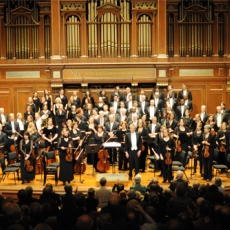
Boston Baroque - Haydn Creation - Monteverdi: Il ritorno d'Ulisse in patria - Boston Globe
It felt good to be back in a concert hall.
In fact, after the darkest of weeks, it felt surprisingly normal to be there. Concertgoers ambled slowly to their seats in Jordan Hall on Saturday, talking of rescheduled events and what David Ortiz had said at Fenway Park earlier in the day. There was little obvious sense of angst, and that itself was reassuring.
Of course, the aftermath of the Boston Marathon bombings hung around everyone. And in a hard-to-believe bit of serendipity, Boston Baroque had programmed Haydn's "Missa in Angustiis," whose title translates as "Mass in Troubled Times." The trouble in Haydn's day (1798) came from Napoleon, who had already threatened Vienna and was attempting to conquer Egypt. Right around the time of the premiere, Napoleon's forces were defeated by Admiral Horatio Nelson's British fleet, and in time the piece became known as the "Lord Nelson Mass."
Though Haydn didn't know the outcome when he wrote the piece, the Mass conveys terror and celebration. It was fitting for Boston in another way. Haydn's music is deeply felt but rarely confessional. It doesn't wallow in sentiment. But it has more than its share of sincerity, dignity, and sturdiness of a kind that defies the world's uncertainties. It seemed to be just what a bruised yet resilient city needed.
That mix of anxiety and joy came out vividly during Saturday's performance. Haydn's orchestra had no wind players - his patron had fired them because of money troubles - and the sound of strings, organ, trumpets, and timpani gives the sound a lean, dark coloring. The opening "Kyrie" was terrifying. So was the explosion of brass and drums near the end of the "Benedictus," music that must have had Haydn's audience thinking that the end of the world was at hand. The lighter moments glided along with unfailingly natural momentum.
Was there an extra quantum of intensity, brought on by the week's events? Perhaps, but it could just as easily have been the response of great musicians to music already imbued with drama. At all events, this was simply a magnificent performance, played with astonishing precision and led with authority by Martin Pearlman. The four soloists - soprano Mary Wilson, mezzo-soprano Abigail Fischer, tenor Keith Jameson, and bass Kevin Deas - sang beautifully as individuals and were perfectly matched as a quartet. The trumpets and timpani outdid themselves, as did the chorus, whose rich sound belied the fact that there were only 21 singers onstage.
The concert opened with Haydn's Symphony No. 102, a piece overflowing with the kind of invention and wit that Haydn made almost routine. It too was well played, though there was some uncertainty in the strings. The finale was almost impossibly light on its feet - full of surprises, yet with an exultant ending never in doubt. It was good to be back in a concert hall.